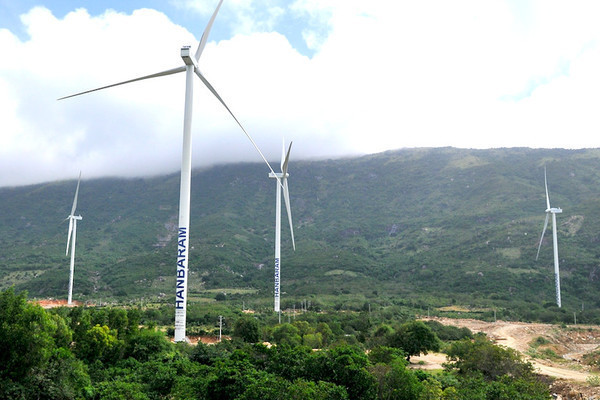
On March 20, the Ministry of Industry and Trade (MOIT), State Capital Management Commission (SCMC) and Electricity of Vietnam (EVN) organized a working mission with the investors of transitional wind and solar power projects. These are the projects that were not completed by November 1, 2021 to be able to enjoy the FIT (feed in tariff) price, and they are now awaiting a new pricing policy.
Nguyen Thi Thanh Binh, deputy CEO of T&T Group, said because of Covid-19, many of these renewable power projects were not completed before the deadline to be able to enjoy the FIT price. After that, Circular 15 and Decision 21 were issuers but investors complained that the legal documents "contain unreasonable provisions" that affect investors’ benefits.
Thirty-six enterprises have lodged a petition to the Prime Minister and MOIT about the pricing scheme stipulated in documents they believe are unreasonable.
“In the document, we showed investors’ worries, especially about electricity pricing not suitable to the practice,” Binh said, adding that Decision 21 on electricity price framework for transitional projects were "promulgated in a hurry" without consulting with investors affected by the legal document.
A representative of EVN EPTC (Electricity Power Trading Company) can negotiate electricity prices with investors only when there is guidance from MOIT in accordance with Article 26 of Decree 137.
If the two parties still cannot reach an agreement about electricity price, MOIT will determine a temporary price to be applied until the two sides can agree on an official price.
EPTC has sent a document to 85 investors, requesting them to send dossiers and documents to prove that their wind and solar power plants are transitional projects, and documents about input factors to calculate electricity prices.
However, by March 20, the company had received only one document from a wind power investor.
After MOIT releases guidance about the negotiation method and procedures, EPTC will conduct working sessions with investors. EVN will negotiate in accordance with the principle first come first served. Power plants have to submit sufficient documents via ppa.evn.com.vn. EPTC will negotiate with each plant or each group of plants.
Regarding the methods of calculating electricity prices, EPTC said MOIT has not released guidance on negotiation methods, so the principle of determining electricity prices is that investors have to spend reasonable expenses for the whole economic life of the projects; the profitability rate of the projects must not be higher than 12 percent, and must not exceed the price framework set by MOIT.
The input costs are set by EVN based on Circular 15 and Circular 57 so as to satisfy the specific characteristics of wind and solar power projects.
Explaining why investors still have not submitted dossiers for negotiations, Binh from T&T Group said everything seems to be unclear. She said the instructions need to be clear enough for investors to observe.
“We hope that EVN immediately mobilizes the electricity output of the plants when the construction is completed so as to avoid waste. As many as 34 projects have completed the investment and construction stages (28 wind power and 6 solar power),” Binh said.
“If you witness a vast wind power farm with so many turbines, each of which is worth VND150 billion, standing still over the last year, you will feel so tormented,” she said.
Meanwhile, EVN has to buy electricity from other sources at prices higher than the renewable energy sources.
“Mobilizing the electricity output of the projects where the construction has been completed is an urgent need,” she said.
“We suggest that the electricity price is equal to 90 percent of import price. This is the price temporarily applied for the time being. Later, when official prices are determined, the revenue will be recalculated,” Binh said.
Having four transitional renewable power projects, Bamboo Capital has also proposed that MOIT and EVN mobilize the output of the completed projects in order to avoid the waste of resources.
EVN said the two proposals from investors about the low-price frames and mobilization of electricity output are not within the jurisdiction of EVN.
EVN’s CEO Tran Dinh Nhan said EVN anticipated that there must be a policy applied to renewable power development after the FIT-price period.
“We have had the price frame set by MOIT, while EVN has figured out negotiations plans. If problems arise about capacity release, EVN will raise its opinions during the negotiations,” he said, urging investors to submit necessary documents.
Luong Bang